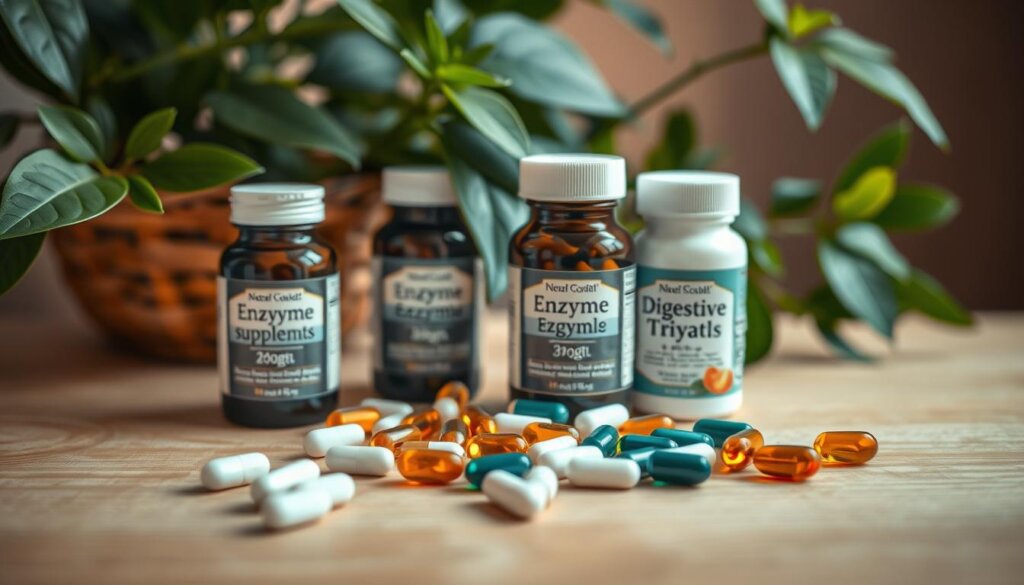Did you know over 60% of adults in Malaysia experience occasional digestive discomfort? This startling statistic highlights why more people are turning to enzyme supplements to support their wellness goals. These specialized proteins play a vital role in breaking down food, ensuring nutrients get absorbed efficiently.
Digestive enzymes naturally occur in the body, produced in areas like the mouth and pancreas. However, factors like aging or dietary changes can reduce their effectiveness. This is where high-quality supplements step in, offering targeted support for those struggling with bloating, indigestion, or nutrient deficiencies.
Wellness Group, a trusted name in enzyme solutions, emphasizes that not all products work equally. The market’s rapid growth – particularly across Southeast Asia – means consumers need clear guidance to avoid ineffective options. Quality matters: superior formulations contain specific enzyme blends that match individual needs, whether for lactose intolerance or plant-based diets.
This guide simplifies the selection process, helping readers identify supplements that align with their unique health requirements. From understanding enzyme activity levels to recognizing third-party certifications, every detail contributes to better digestive outcomes.
Key Takeaways
- Enzyme supplements aid nutrient absorption and address digestive discomfort
- Body enzyme production decreases with age and dietary changes
- Malaysia’s market shows rising demand for digestive wellness products
- Product quality varies significantly based on ingredient composition
- Expert guidance ensures personalized enzyme selection
Introduction to Digestive Enzymes and Their Role in Fiber Breakdown

Click to LEARN MORE
Nutrient absorption begins with enzymes, the unsung heroes of your digestive system. These biological catalysts accelerate chemical reactions that break down meals into usable nutrients. Without them, even the healthiest foods couldn’t fuel your body effectively.
What Are Digestive Enzymes and How Do They Work?
Digestive enzymes are proteins produced in organs like the pancreas and small intestine. Each type targets specific nutrients: amylase transforms carbs into sugars, protease dismantles proteins, and lipase converts fats into energy sources. They thrive in different pH environments – from the acidic stomach to the alkaline small intestine.
Age and lifestyle factors often reduce natural enzyme production. This decline can lead to bloating or nutrient deficiencies, especially when consuming fiber-rich foods. Supplements help bridge this gap by supporting your body’s existing processes.
Benefits of Enzymes for Gut Health and Digestion
Enzymes do more than ease discomfort. They enhance nutrient uptake from plant-based diets and dairy products. For Malaysians enjoying local staples like nasi lemak or roti canai, proper enzyme activity ensures optimal energy extraction from complex carbs and spices.
Regular enzyme support also promotes a balanced gut environment. This strengthens the digestive tract’s lining and improves resistance to occasional indigestion. When your system breaks down foods efficiently, you absorb more vitamins and minerals essential for long-term wellness.
The Science Behind Enzyme Blends and Supplement Potency
Modern enzyme supplements rely on precise combinations of specialized proteins to maximize digestive support. Unlike single-enzyme formulas, strategic enzyme blends work synergistically to break down diverse nutrients – from spicy rendang proteins to coconut milk fats.

Different Types of Enzymes: Protease, Amylase, Lipase, and More
Protease targets protein-heavy meals, splitting them into amino acids for muscle repair. Those enjoying grilled chicken or tofu benefit most from this enzyme. Amylase focuses on carb-rich foods like rice or noodles, converting starches into quick energy. Meanwhile, lipase tackles fatty dishes, supporting gallbladder function and nutrient absorption.
Advanced blends often include cellulase for vegetable fiber and lactase for dairy. Plant-based enzymes outperform animal-derived options because they remain active from the stomach to intestines without artificial coatings.
Understanding Enzyme Measurements and Activation Units
Potency isn’t measured in milligrams but in activity units like HUT (protease) or DU (amylase). A 10,000 HUT enzyme blend can process more protein than a 5,000 HUT version. Higher FCCIP ratings in lipase indicate stronger fat-breaking capacity.
This measurement system ensures consistent effectiveness across batches. For Malaysians seeking reliable supplements, checking these units guarantees they’re getting genuine digestive support rather than filler-heavy products.
How to choose the right enzyme fiber
Effective digestion hinges on matching supplements to specific challenges. The process begins by observing how your body reacts to different foods. For example, discomfort after enjoying teh tarik or cheese-based dishes often signals lactose intolerance, requiring targeted lactase support.

Identifying Specific Digestive Needs and Issues
Track recurring symptoms like bloating or gas after meals. Dairy lovers experiencing stomach cramps might benefit from lactase-focused formulas. Those struggling with protein-heavy dishes like satay could require protease-rich blends. Wellness Group’s personalized consultations help pinpoint these needs through dietary pattern analysis.
Evaluating Ingredients and Product Labels for Enzyme Blends
High-quality labels specify activity units like HUT (protease) or FCCIP (lipase). A product listing 15,000 DU amylase breaks down rice better than vague “digestive blend” claims. Broad-spectrum options suit varied diets, while specialized formulas address persistent issues like carb intolerance.
For Malaysian food enthusiasts, enzyme supplements with cellulase improve vegetable fiber breakdown – perfect for ulam lovers. Always verify third-party testing to ensure potency matches label promises.
Practical Tips for Selecting Enzyme Supplements

Click to LEARN MORE
Navigating the world of enzyme supplements becomes easier with practical strategies. These tips combine scientific insights with real-world application, ensuring users maximize their digestive support without guesswork.
Expert Recommendations from Wellness Group
Wellness Group specialists suggest starting with half the recommended dose for new users. This approach lets your body adapt while monitoring improvements in bloating or discomfort. Their team notes:
“Consistency matters more than quantity. Take supplements 15 minutes before meals for optimal enzyme activation.”
| Enzyme Type | Targeted Foods | Expected Results |
|---|---|---|
| Lactase | Dairy products | Reduced bloating in 3-4 days |
| Protease | Meat, legumes | Improved protein digestion |
| Cellulase | Vegetables | Better fiber breakdown |
Integrating Enzyme Supplements into Daily Routines
Pair supplements with your most challenging meals first – like spicy curries or rich desserts. Track reactions in a food journal to identify patterns. Wellness Group’s nutritionists emphasize:
- Avoid products with magnesium stearate or artificial colors
- Weekend availability for consultations: 10 AM – 5 PM
- Direct line for Malaysian residents: +60123822655
Most users notice changes within 72 hours, though individual responses vary. For persistent issues, their experts recommend adjusting enzyme blends rather than increasing dosage.
Conclusion
Proper digestive support transforms how your body interacts with food. Matching enzyme formulations to specific needs – whether tackling lactose intolerance or processing carb-heavy meals – creates lasting improvements in comfort and nutrient absorption.
High-quality digestive enzymes offer benefits beyond easing bloating. Plant-based options work efficiently across the entire digestive tract, breaking down proteins, fats, and complex carbohydrates without artificial additives. This ensures better vitamin uptake from local favorites like nasi kerabu or curry laksa.
Wellness Group experts highlight three keys for success: identifying trigger foods, selecting activity-tested products, and maintaining consistency. Their team provides personalized guidance to address unique challenges, from managing post-meal symptoms to optimizing gut health.
Ready to experience the difference? Connect with Wellness Group’s specialists for formulations tailored to your diet and lifestyle. Better digestion starts with enzymes that work with your body – not against it.
FAQ
What are digestive enzymes, and why are they important?
Digestive enzymes like protease, amylase, and lipase help break down proteins, carbs, and fats. They support nutrient absorption and ease discomfort such as bloating or gas, promoting smoother digestion.
How do enzyme blends improve gut health?
Enzyme blends combine multiple enzymes to target diverse foods. For example, a mix of lactase and cellulase may help with dairy and plant fibers, reducing digestive stress and improving overall gut function.
What should someone look for in enzyme supplements?
Check labels for enzyme types (like bromelain or papain) and potency measurements (e.g., ALUs or HUTs). Brands like NOW Foods or Garden of Life often list these details. Avoid fillers and prioritize blends matching specific needs, like lactose intolerance.
Can enzyme supplements replace a balanced diet?
No. These products complement meals but shouldn’t substitute whole foods. They’re ideal for occasional support, especially when eating hard-to-digest items like beans or cruciferous veggies.
How do activation units impact supplement effectiveness?
Activation units (like FIP for protease) indicate enzyme strength. Higher units mean faster breakdown of food particles, which may reduce bloating after meals. Always consult dosing guidelines to avoid overuse.
Are plant-based enzymes better than animal-derived options?
Plant-based enzymes, such as those from fungi or probiotics, often work across a wider pH range. This makes them effective in both stomach and intestinal environments, ideal for sensitive systems.
When should someone consider enzyme supplements?
If meals regularly cause discomfort, gas, or irregularity, supplements might help. Brands like Enzymedica or Pure Encapsulations offer targeted formulas for issues like gluten sensitivity or low stomach acid.
Can enzymes interact with medications?
Certain enzymes, like bromelain, may thin blood or affect antibiotics. Always consult a healthcare provider before pairing supplements with prescriptions to ensure safety.






